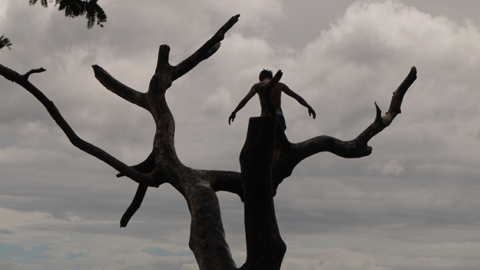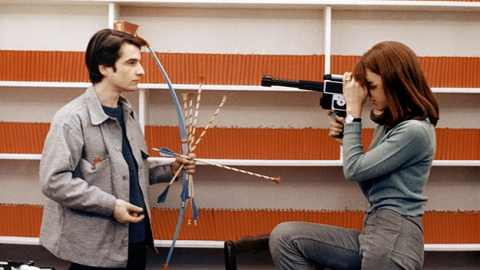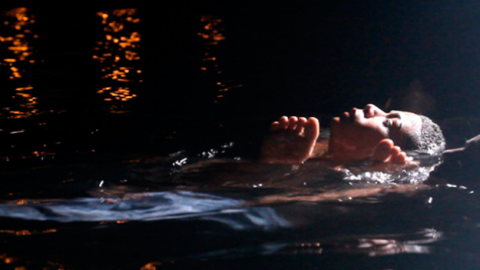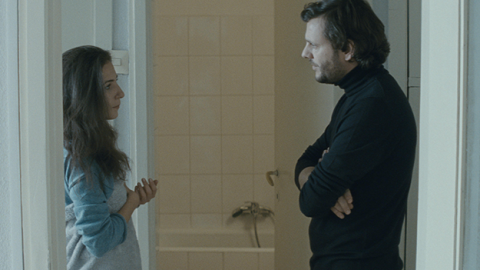Festivals: Syros
This year’s edition of the Syros International Film Festival in Greece opened two days before the country’s bailout referendum and ended on what was supposed to be the day of the decision regarding the Euro. It was a strange time to be on a sunny, beachy island. And at a film festival, no less—a place which even in the most uneventful times tends to isolate its participants in a cinema-party bubble.
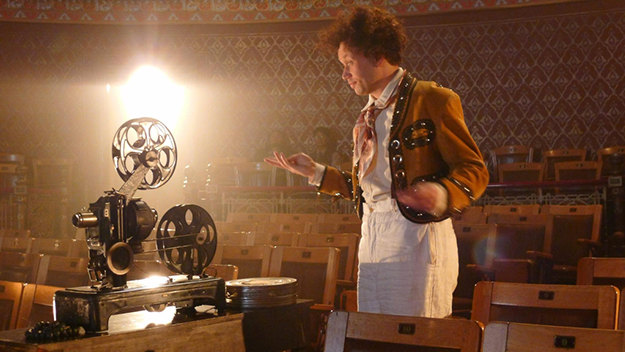
Eisenstein in Guanajuato
At Syros, the show went on, with only small and occasional indications of what was happening politically. Some mishaps—cancellations, or last-minute venue changes, for instance—were obliquely related to the crisis, while others were mere consequences of overly ambitious plans. In its third year, organized by a cohort of young American expats and Greek nationals, the festival was still in a nascent state. The programming tends toward under-the-radar festival-circuit fare and demonstrated a tremendous amount of freedom from constraints. New features, shorts, and mid-length films from around the world were equitably balanced with retrospective titles. Additional events included a series of talks on the transition from film to digital, one featuring Albert Serra, and invited guests including Peter Greenaway, who ultimately cancelled his appearance, though his Eisenstein in Guanajuato did screen. A residency program for aspiring filmmakers was launched, this year overseen by American experimental filmmaker Deborah Stratman.
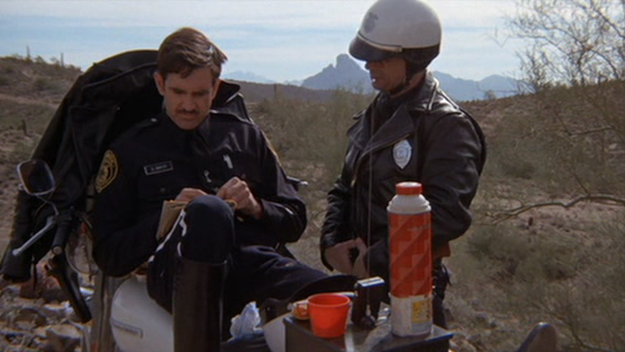
Electra Glide in Blue
Among the vintage selections were Barbara Loden’s Wanda and James William Guercio’s Electra Glide in Blue in the sidebar “Outsiders in American Cinema,” which focused on one-off directors and their often anti-establishment subjects; the 1980 version of Robert Flaherty’s Moana with sound, screened alfresco in a functioning shipyard; and Ford’s Stagecoach, presented in a drive-in constructed solely for this year’s festival at the opposite end of the island. Though billed under several broad themes such as “Interior/Exterior,” and “Lands and Locality,” much of the retrospective selection mostly seemed to reflect the programmers’ esteem for the films rather than intrinsically shared qualities or any other overriding logic. But the looseness did suggest that the mandates which often come down from funding bodies and government interests hadn’t yet taken hold.
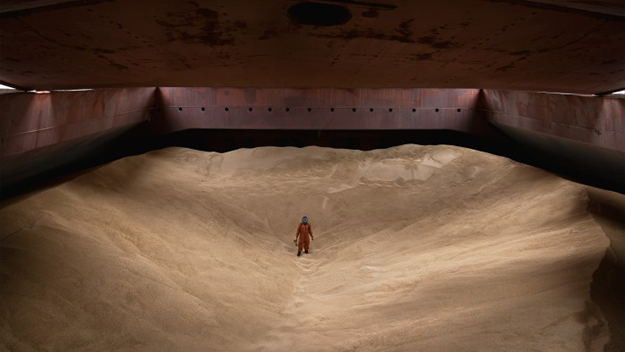
Exotica, Erotica, Etc.
Visual echoes and recurring themes were nonetheless evident in the contemporary programming. The opening-night film, Evangelia Kranioti’s Exotica, Erotica, Etc., which premiered at Berlin, is an accomplished new entry in the ever-expanding subgenre of “boat documentaries” (e.g., The Forgotten Space, Leviathan, From Gulf to Gulf to Gulf, Scrap Vessel). Kranioti’s nonlinear film traces the lives and memories of sailors on a Greek shipping rig, and of the sex workers who briefly meet them along the shore; the interactions between the two, portrayed primarily through the monologue of a retired prostitute, are often tender and meaningful rather than coarse or exploitative. Grounded by dramatic vignettes of humor, joy, and sex, Exotica, Erotica, Etc. keeps moving along without compromising its unorthodox narrative structure, making it an unusually adventurous but utterly captivating choice for an opening-night film.
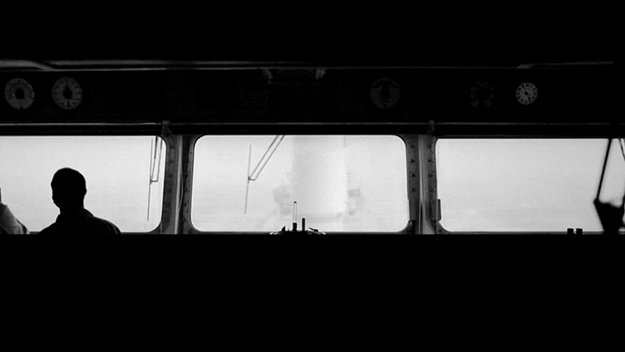
Transatlantic
Less successful on these terms was the other at-sea selection, Transatlantic. This debut feature by Canadian Felix Dufour-Laperrière is a documentary essay shot onboard a cargo ship traveling from Antwerp to Montreal. The 30-day journey unfolds slowly and moodily as it depicts, in muted black-and-white, the routines of the ship’s workers and their environment. It’s an impressive photographic exercise that grows interminably dull and tedious over its 72-minute run time—the drudgery of the ship life on display bleeds into the experience of watching the film. There are only so many shots of sea-to-horizon chiaroscuro that one feature-length film—even an experimental one—can support.
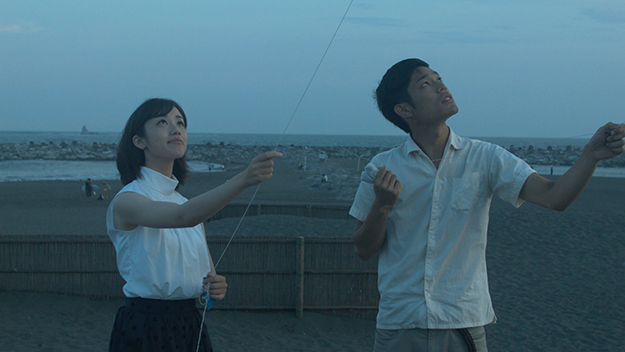
Chigasaki Story
Far lighter and entertaining (and remaining close to the shore) was Chigasaki Story, the debut of Japanese director Misawa Takuya, which was in Rotterdam’s Bright Future section this year. Shot in the seaside inn where Yasujiro Ozu wrote Tokyo Story and Late Spring, the film revolves around the fleeting, confused, and misdirected attractions among the resort’s young guests and workers. The unfulfilled or unfortunately fulfilled romances shape the film’s nicely paced narrative, with measured ups and downs that produce the kind of mysterious satisfaction and understated comedic moments of a Rohmer plot.
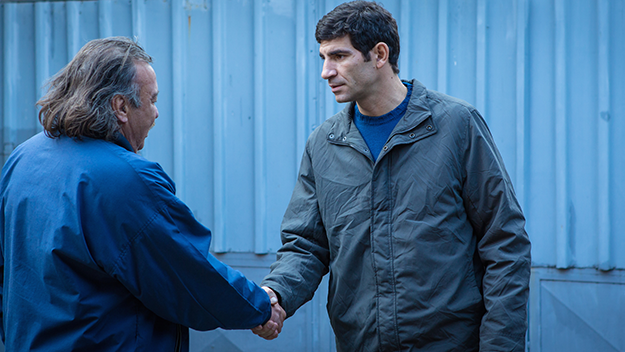
The Treasure
Corneliu Porumboiu’s The Treasure, which won the Un Certain Talent award at Cannes and had its Greek premiere here, also uses a light touch, especially compared to the Romanian director’s previous work, which was presented in a mid-career retrospective (five features, three shorts). Porumboiu’s story of two broke middle-class Romanian men digging for Communist-era treasure in a suburban backyard stirs the problems of the past and the present into an ever-present quest for a little more cash. The money hiding and hoarding, and ambient political uncertainty, undoubtedly had an added resonance given Greece’s predicament. But while the film always seems poised to go to a darker place, through an escalation of bickering or a promise left unfulfilled, it instead finishes with a ludicrous scene that presents, in its own strange way, a fantastical break from the histories and socioeconomic context of its characters.
The slate’s serious-minded and artistically challenging works were often at interesting odds with both the sunshine and the backdrop of economic and social worries. Though still finding its way, Syros is admirably staking out a bit of idiosyncratic programmatic territory out in the Aegean.



